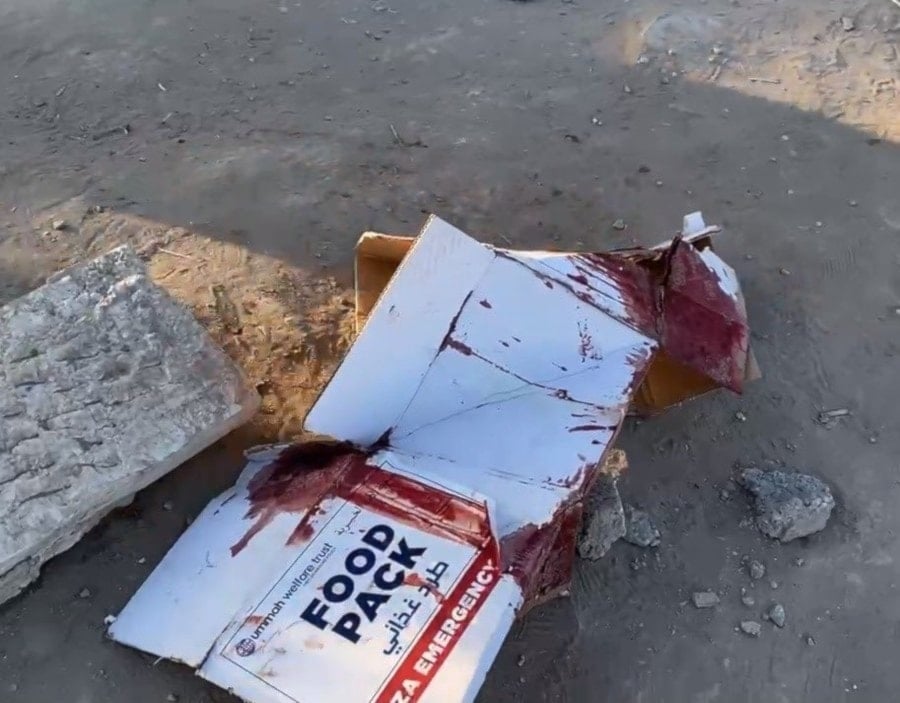'Israel' main disruptor of US maritime aid delivery plan: The Guardian
The Guardian reports that Israelis have been blocking access to northern Gaza and could be the main obstacle of aid distribution in the Strip.
-

An aid package drowsed in blood is seen lying in an area to the west of Gaza City, where occupation forces killed and injured more than hundreds of Palestinian civilians waiting for aid, in the Gaza Strip, Palestine, on February 29, 2024. (Social media)
The US proposal for its military to construct a floating pier off the Gaza coast is a significant initiative, evoking memories of the Mulberry harbors constructed after D-Day in Normandy, as described in a report published by The Guardian on Friday.
However, it expressed serious concerns that any aid it delivers is a fraction of what Palestinians need, who are on the brink of starvation.
The United States, Jordan, Egypt, France, and the UAE had announced earlier carrying out several "airdrops" to deliver aid to Gaza. However, the entire operation was deemed a worthless PR stunt as the dropped food supplies did not amount to a fraction needed and due to Washington's ability to force Israelis into opening land routes to deliver necessary aid - but chose not.
Read more: War on Gaza orphaned 17,000 children, UNRWA finds
“When we talk about the sea route, it’s going to take weeks to set up and we are talking about a population that is starving now. We have already seen children dying of hunger,” said Ziad Issa, the head of humanitarian policy at the ActionAid charity.
Israeli inspectors will be "checking" aid shipments entering southern Gaza at the Cypriot port of Larnaca. Meanwhile, top Israeli political and military officials had opposed aid delivery to Gaza repeatedly, which could significantly disrupt the process.
“People say this is a complex situation, but it’s very simple,” Issa said. “Israel is not allowing aid to get to the Gaza Strip.”
Read more: 20 Palestinians killed by malnutrition, dehydration: Palestinian MoH
Gaza's population, which is still being forcibly displaced by Israelis, is not concentrated on the coast, raising further questions regarding who will be in charge of distributing the aid within Gaza.
“Who is going to distribute it?” asked Jeremy Konyndyk, a former senior aid official in US President Joe Biden's administration, and now president of the Refugees International aid advocacy group.
“The aid organizations’ presence in northern Gaza is pretty close to zero because the Israelis have wanted everyone out and then have been restricting access to the north ever since.”
The maritime corridor, Konyndyk said, “doesn’t obviate the problem of obstruction by Israel, but rather than being a problem at the entry point, now it’s going to be a problem at the distribution stage."
“You need drivers that don’t exist, trucks that don’t exist feeding into a distribution system that doesn’t exist."
Read more: MoH decries silence on Israeli crimes against Gaza women on Int'l. Day
Israelis blocking aid
On February 29, over 110 Palestinians were killed by Israeli occupation forces in Gaza City in what became known as the Flour Massacre while gathering to receive basic food aid.
The Palestinian Health Ministry in Gaza reported on Friday that 30,878 Palestinians have been killed and 72,402 wounded by the Israeli occupation as the genocide enters its 154th day.
The ministry pointed out that 72% of the martyrs are children and women, with the United Nations Relief and Works Agency for Palestine Refugees UNRWA revealing that, on average, 63 women are killed in Gaza every day.
“Even if there is a ceasefire, it is going to be very messy for the initial period because the security apparatus that used to exist has collapsed,” Konyndyk said. “And from what we saw in the incident last week, the Israeli military is not a reliable security guarantor."
“It’s very tough and I think it’s worthwhile to try this,” he added. “I think they’re going to be figuring a lot of it out as they go, and I think that’s OK. I’m in favor of anything that helps at this point."
“But let’s also just be realistic about why this is necessary, and it’s necessary because of five months of obstruction of access in the north by the IDF and five months of intentional degradation of humanitarian capacity in the strip,” the former official said.
'Worst I have ever seen'
A UN expert said earlier that the Israeli occupation was destroying Gaza's food system as part of a larger "starvation campaign," with aid authorities warning of a potential famine.
In a speech to the UN Human Rights Council on Thursday, Michael Fakhri, UN Special Rapporteur on the Right to Food, asserted that the organization was "doing nothing" as "unbearable" images surfaced from Gaza.
Fakhri told the council that "Israel has mounted a starvation campaign against the Palestinian people in Gaza," adding that this included fishermen, whose numbers indicated that around 80% of the Strip's fishing sector had been damaged since October 7.
He further called on member nations to consider imposing sanctions against "Israel" and stopping military supplies that are being used in the ongoing genocide in Gaza.
"This is on your watch. Please turn your words into action," he said.
After an eight-day expedition to the south of the besieged Strip, Delomier, the deputy director of Handicap International - Humanity & Inclusion, said he saw "kilometers of trucks queueing on four lanes, all waiting to get into Gaza," stressing that while planes drop "a few pallets" there are kilometers of pallets "just behind."
What was taking place in Gaza was the "worst I have ever seen," he said, and that what he saw in Bosnia and Herzegovina in the 1990s was "incomparable" to what he saw in the Strip; a "mousetrap, with only a trickle of aid."

 5 Min Read
5 Min Read








